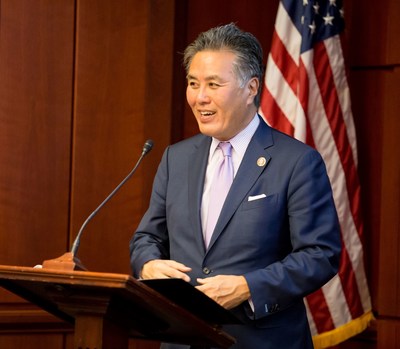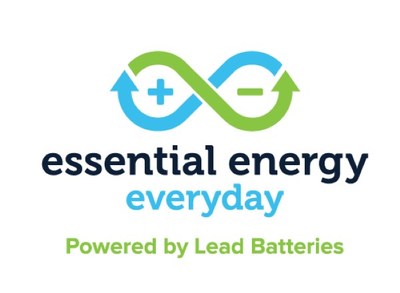|
14.02.2019 20:15:00
|
Bipartisan Agreement: Energy Storage Is The Future Of Renewable Energy
WASHINGTON, Feb. 14, 2019 /PRNewswire/ -- Getting charged up about National Battery Day February 18, requires no batteries at all. Around the world, the need has never been greater for innovative storage solutions, especially advanced lead batteries. They have a 150-year proven track record and are poised to meet growing demand and future applications. The need for more research and investment in energy storage (synonymous with batteries) was made clear this week in Washington, D.C.

Capitol Hill Briefing: Bipartisan Agreement and Progressive Industry Research
Reports of divisions in Congress were disproved during a Capitol Hill briefing organized by Battery Council International on February 12, in advance of National Battery Day. California Rep. Mark Takano (Democrat) and New York Rep. Chris Collins (Republican) who serve as co-chairs of the Advanced Energy Storage Caucus, agreed that the need for research into energy storage is an area of alignment for both Democrats and Republicans.
Rep. Takano noted that he co-founded the caucus after a staff member provided him with a policy paper in 2015 that described energy storage as "the next big thing." His goal is to advocate for advanced energy storage research and to explore policies that encourage battery storage development. "I'm passionate about this issue because [the] security and sustainability of our energy infrastructure affects every community across America."
Takano added that "Energy storage is the future of renewable energy. Cheap grid-scale storage means that renewables can compete with fossil fuels on cost alone. This is not only better for our environment, but also makes our national grid more secure from natural disasters."
Rep. Collins noted that energy storage means energy independence, "and that's what's good for America." He said that the current downside of solar and wind power is that wind and sun aren't always available, so "We have to store the energy in a way that's real and sustainable, and the technology is not quite there … we need breakthroughs." He stressed that the place for governmental funding is funding research, noting that the moon landing, semiconductors and other technological advancements are the result of government funding.
"In the energy storage world, if we're going to be energy independent … and support all of the above [renewable sources], which includes modular nuclear, it's always going to include some level of fossil fuels, [and] clean and efficient, it's going to include wind and solar." He recognized that many attending the briefing were Hill staffers. He advised them to "Bring this message back. 'This is a good thing to support whether you're a Republican or Democrat, and this is for America and its future. Energy independence is the holy grail of our future.'"
Takano's closing message was to applaud the lead battery industry's efforts, including lead battery recycling. "As we have honest conversations about batteries, battery storage and renewable energy, we cannot ignore the environmental life cycle of these batteries. I commend the leading science and business leaders who are pioneering developments on battery research. Together, we can pave the way for a sustainable future for every community."
Following the supportive comments by the congressmen, Dr. Tim Ellis, president of Dallas-based RSR Technologies, was one of several experts who shared highlights on innovative lead battery research. "It's a really exciting time for lead [batteries]." He cited ongoing research at Argonne National Laboratory to better understand the performance of lead batteries at the molecular level leading to better dynamic charging acceptance and improved cycle life.
Other panelists included representatives ranging from Argonne National Laboratory and The Sustainability Consortium, to the electric and gas utility company Ameren. Panelists stressed the importance of supporting lead battery research, in addition to the research underway with Argonne National Institute, Missouri University of Science and Technology, and others. The panelists addressed how the results will stretch the bounds of lead battery innovation and performance to meet the growing needs of electrification, renewable energy storage, the automotive industry, sustainable manufacturing and more.
To further convey that message, Essential Energy Everyday (EEE) has released a new video called "Future Powered by Lead Batteries", which describes how lead batteries are an indispensable part of our everyday lives and our green energy future. Lead batteries provide the energy for our growing global economy, supporting renewable energy, greener transportation and our critical infrastructure. EEE has also published two new infographics that highlight the role of lead batteries in combatting climate change using start-stop technology and electric vehicles (EVs).
Transportation: Lead Batteries Reduce Greenhouse Gases
Currently, transportation is the largest contributor to greenhouse gas emissions. Lead batteries are helping to reduce those emissions and boost fuel economy by supporting fuel-saving electric vehicles (EVs) and start-stop technology. Here are some facts:
- By 2020, it's predicted that advanced start-stop vehicles powered by lead batteries will eliminate two million tons of vehicle greenhouse gas emissions annually.
- Lead batteries are used worldwide in virtually every hybrid and EV. EVs depend on lead batteries for critical safety and security functions. (A Tesla has one to power electronics.)
- The growth of EVs depends, in part, on accessible, reliable public charging stations. Lead batteries store, regulate and ensure power at EV charging stations – even during extreme weather and peak energy demand.
Celebrating a 100% Recyclable Battery
There's another reason to celebrate lead batteries on National Battery Day. Unlike other battery chemistries, lead batteries maintain an almost 100-percent recycling rate in the U.S. From design through recycling and re-use, the circular economy of lead batteries greatly reduces their environmental footprint. Lead batteries are the most environmentally sustainable battery technology and a leader in providing stored energy to meet our growing needs.
Learn More at Essential Energy Everyday
Essential Energy Everyday exists to increase awareness of the critical importance of lead batteries in powering our daily lives. It encourages continued investment in sustainable lead battery technology to store and provide energy on demand. Its initiative is supported by the two global trade associations that represent the lead battery and lead industries, Battery Council International and the International Lead Association.


![]() View original content to download multimedia:http://www.prnewswire.com/news-releases/bipartisan-agreement-energy-storage-is-the-future-of-renewable-energy-300796156.html
View original content to download multimedia:http://www.prnewswire.com/news-releases/bipartisan-agreement-energy-storage-is-the-future-of-renewable-energy-300796156.html
SOURCE Battery Council International
 Der finanzen.at Ratgeber für Aktien!
Der finanzen.at Ratgeber für Aktien!
Wenn Sie mehr über das Thema Aktien erfahren wollen, finden Sie in unserem Ratgeber viele interessante Artikel dazu!
Jetzt informieren!